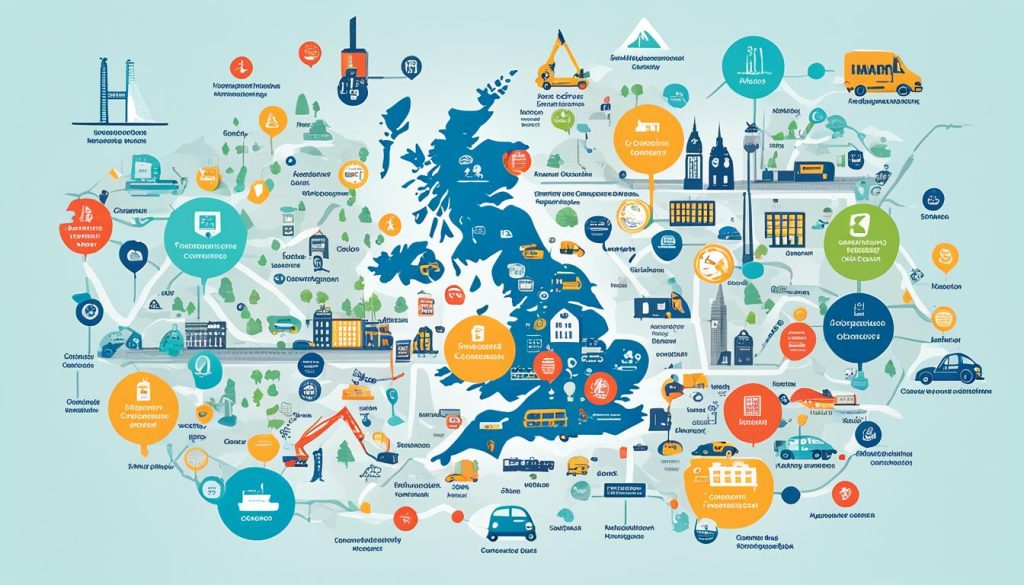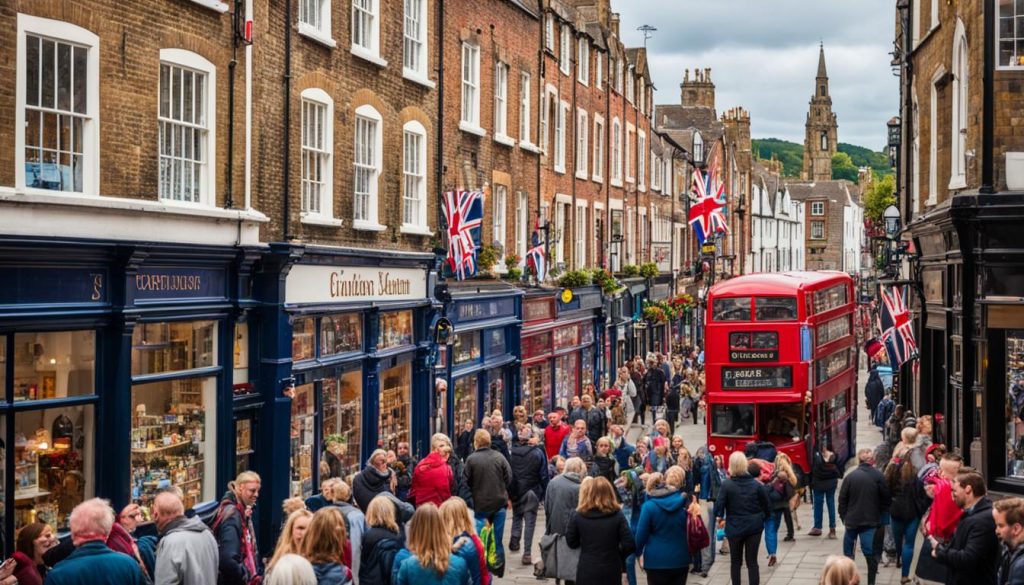Moving to the UK is more than just packing and booking a flight. It’s about becoming part of British life. This guide makes transitioning easier, offering tips for embracing the culture and everyday living. It covers finding a home to getting familiar with British customs.
Maybe you’re moving for work, study, or to explore historic places. Paying attention to details is key. Learning to love the weather, standing patiently in lines, and enjoying a good cup of tea are all important. This guide will help you smoothly start your new British life.
Understanding British Culture and Customs
Starting life in the UK is full of tradition and social cues. To get on well, it’s key to dive into British life wholeheartedly. Knowing about British customs, UK social norms, and understanding British etiquette helps a lot.
Embracing Pub Etiquette
Going into a British pub is more than just getting a drink. It’s entering a space with unwritten rules. Knowing these rules helps enjoy British social life more.
- Buying drinks in rounds is a way to show friendship; it’s your turn next.
- Be friendly with locals but also respect their personal space.
- Learn the bar’s queuing system – waiting your turn is important.
Queuing: A National Pastime
Queuing is a key part of British culture, showing fairness and order. Whether waiting for a bus or in a shop, queuing correctly is crucial.
- Always join the queue at the end, never skip.
- Keep a good distance from the next person.
- Staying patient is essential – rushing is frowned upon.
Tea Time: More Than Just a Drink
Tea is a key ritual in Britain, offering moments of calm and togetherness. It’s important to know this ritual to truly get British customs.
- Afternoon tea is often a social moment with snacks.
- Knowing how to serve and brew tea is an art.
- Tea time is a chance to take a break, whether alone or with others.
By getting involved in these traditions, newcomers can feel at home in the UK. It makes for a fuller British experience.
Navigating the UK Healthcare System

If you’re getting used to life in the UK, figuring out the National Health Service (NHS) is key. Accessing UK medical care might seem tough at first. Yet, with the right info, it becomes easy. This guide covers NHS services and how to register for UK healthcare.
Start by registering with a General Practitioner (GP). Find a local surgery and fill out their form. Once you’re registered, you get free healthcare through the NHS. So, it’s best to do this soon after arriving in the UK.
- Find a GP close to where you live.
- Collect necessary documents – like proof of address and ID.
- Send your registration forms to the chosen GP surgery.
- Wait for registration confirmation and then book your first check-up.
Emergency services are open to everyone, even if you’re not registered. But, to fully use NHS services, you need to be registered. For non-urgent medical advice, NHS 111 is there to help.
- Pharmacy Services: For small illnesses and injuries, pharmacies offer advice and treatments without a prescription.
- Dental Care: NHS provides dental services, but they may charge. Make sure to register with an NHS dentist.
- Specialist Treatment: If needed, your GP will refer you to specialists. While the NHS pays for most healthcare, there might be charges for some services, like prescriptions.
When using UK medical care, knowing what you’re entitled to is vital. Most NHS services won’t cost you anything, but there are some fees. These can include costs for prescriptions, dental care, and eye exams, depending on where you stand.
The NHS has plenty of online resources to guide you through your healthcare rights and duties. Knowing the system, registering quickly, and understanding available services makes managing your health in the UK simple.
Finding Accommodation: Where to Start

Starting the search for a new home in the UK can be overwhelming. You might be deciding whether to rent or buy. Your choice greatly affects your lifestyle and comfort.
Choosing the Right Area
Choosing a good location is vital. Think about how far you’ll travel to work and if the schools are good. Look at the area’s safety and if it has the shops and transport you need.
Also, consider if you want a busy city, a quiet suburb, or the countryside. Each area has a unique vibe and community feel.
Renting vs Buying a Home
- Renting: Gives you flexibility and less upfront cost. Perfect for those who aren’t ready for a long-term commitment or don’t want to handle maintenance.
- Buying: Needs more money at the start, but offers a stable home. Plus, you could make money as your property’s value increases. Getting a mortgage depends on your finances and takes time.
It’s important to think about what suits your life now and in the future. Consider both renting and buying before making your decision.
Understanding Council Tax
Council tax is a key part of living in the UK, whether you rent or own. This tax pays for public services like rubbish collection, schools, and police. Your bill depends on your home’s value and your local council’s rates. Always include this cost in your budget when picking a place to live.
Getting Around: UK Transport Options

Knowing how to get around is key when living in the United Kingdom. The transport networks in the UK are wide-ranging. They have something for everyone, from daily travelers to those visiting occasionally.
- Understanding UK Public Transportation
UK travel’s backbone, public transportation, includes buses, trams, trains, and the London Underground. These are often reliable and less expensive than driving, especially when using travelcards. These cards make fares cheaper for frequent users. The Oyster card makes travelling across London easy with a simple tap system. However, in rural areas, bus services might not be as regular.
- Driving in Britain
Driving in Britain means you need a UK license or an international permit. It’s crucial to know the local road rules and understand the costs of having a car. These include insurance, road tax, and upkeep. Big cities might have congestion charges and parking costs, so think about these before choosing to drive.
- Exploring Beyond the Mainland
Looking to see more than just the mainland? There are ferries to nearby islands and Europe. Domestic flights quickly connect major cities, offering fast ways to reach Northern Ireland and places like the Isle of Man and the Channel Islands.
- Invest in a railcard for big savings on trains if you qualify.
- Look into bike-sharing in big cities for a fast, green, and healthy way to travel.
- Get transport apps on your phone for live updates and to plan trips across the UK public transportation network.
Learning local transport manners is also important, like giving your seat to those who need it and standing on the right on escalators. With some planning, navigating the transport networks in the UK becomes easy. Soon, you’ll travel like a local!
Managing Your Finances

Understanding financial management is crucial for living in the United Kingdom. This means learning about the UK’s banking system, understanding how living costs vary, and following UK tax laws. Knowing these can make moving to Britain smoother and less stressful.
Setting Up a UK Bank Account
First off, opening a UK bank account is essential. It’s key for daily financial dealings. Banks offer different accounts, from simple to premium options.
- Pick a bank that matches your financial needs and habits.
- Be aware of what you need to open an account, like an address proof and ID.
- Think about using online banking for more convenience.
Understanding the Cost of Living
The cost of living in Britain can change greatly by area. Big cities like London are usually more expensive. To keep on top of your finances:
- Look into the average costs for living in various places, including rent and food.
- Make a budget that includes fun and unexpected costs.
- Use discounts and loyalty schemes to save money.
Dealing with UK Taxes
The UK tax system might seem complex, but it’s key to get your head around it. You’ll deal with income tax, National Insurance, and maybe Council Tax.
- Understand tax bands and how they affect you.
- Remember important tax dates to avoid fines.
- Check out tax reliefs and allowances you could get.
Employment in the UK: Tips for Job Seeking

Looking for a job in the UK is exciting yet challenging. Learn effective UK job hunting strategies to boost your chances. Discover tips on finding work, sorting through job listings, and knowing what UK employers want.
Staying updated with job market trends is key. UK employers look for qualifications, experience, cultural fit, and adaptability. Follow these tips to improve your job search:
-
Update Your CV: Your CV should be current, detailed, and in the British style. Focus on your key successes.
-
Explore Online Job Portals: Check out Reed, Indeed, and the government’s Find a Job service for job opportunities.
-
Networking: Use LinkedIn and go to industry events to make contacts. These can lead to job opportunities and recommendations.
-
Crafting a Covering Letter: Writing a custom cover letter for each job shows your keen interest and fit for the position.
-
Understanding Employment Rights: Learn about UK employment laws. Know your rights on contracts, pay, and hours.
Finding work in the UK may seem hard at first. But with these strategies and a positive attitude, you can forge a successful career. Stay persistent in your job search. Keep up with British employment trends and seek expert career advice when necessary. Your hard work will surely pay off in the UK job market.
Education System in the UK

The UK has a strong education history with many top schools and world-known universities. The education system is well-organised, covering learning from early years to university. It’s key for students and families wanting to make the most of UK’s educational opportunities to understand these details.
Choosing the Right School
Choosing a good school is crucial. It affects a child’s learning and social skills. Things like school achievements, activities, location, and Ofsted ratings are important. The British system offers a variety of schools for different needs and beliefs.
- Primary and secondary schools with strong academic credentials
- Specialist schools focusing on sports, arts, or technology
- Independent schools known for their rigorous curricula and distinguished alumni
- State-funded academies and grammar schools offering alternative curricular approaches
Further Education and Universities
After compulsory education, there are many paths, like vocational courses, A-levels, and apprenticeships. UK universities, such as Oxford and Cambridge, are famous worldwide. They are known for their research, qualifications, and course variety.
- Further education colleges providing vocational qualifications and training
- Comprehensive universities offering undergraduate and postgraduate degrees
- Specialist institutions excelling in arts, fashion, and technology
- Research-intensive Russell Group universities
School Holidays and Term Times
Knowing the school calendar helps with family planning and educational activities. British schools have three terms: autumn, spring, and summer. They also have holidays like Christmas and Easter and a summer break. Universities follow similar schedules but dates can vary. They often have a ‘reading week’ too.
- Autumn term running from September to December
- Spring term from January to March/April
- Summer term from April/May to July
- Regular half-term breaks offering respite to students
Shopping in the UK: Retail Insights

UK shopping experience is quite an adventure. The British high streets are full of different shops for all. You’ll find international brands and traditional British stores on busy streets.
If you’re new to the UK or looking for shopping ideas, start on the high street. It has old department stores, modern fashion shops, and small boutiques. The high street shows the UK’s culture through shops of clothes to homeware.
But, the UK shopping experience isn’t just about physical stores. Online shopping is also huge, offering fast delivery and click-and-collect services. Websites are great for quick buys or special treats, fitting UK’s fast-paced life.
- Find everything from groceries to gadgets on retail websites.
- Compare prices online to ensure you get the best deals.
- Take advantage of seasonal sales and offers prevalent on the high street and online platforms alike.
Local markets are a big part of retail culture in Britain too. They offer fresh food, handmade crafts, and rare vintage items. Weekend markets are good for meeting people, supporting locals, and finding unique things not in big stores.
- Visit farmer’s markets for fresh, locally-sourced ingredients.
- Explore flea markets for vintage clothing and unique antiques.
- Check out craft fairs to purchase handcrafted goods directly from makers.
The UK’s shops are both traditional and modern. Whether you like browsing in stores or online, the UK shopping experience has lots to offer. It focuses on choice, easy access, and making shopping personal.
Exploring British Cuisine

The United Kingdom is a treasure trove of tastes and dining experiences. Each dish tells a story of history and modern innovation. Dive into the culinary history of Britain and find the unique tastes that showcase its cultural identity.
Must-Try Traditional Dishes
Exploring the UK, you’ll find classic British dishes known for their heartiness. These meals are the pillars of Britain’s food tradition.
- Fish and Chips: A classic British dish with battered fish and fries, often with mushy peas and tartar sauce.
- Sunday Roast: A beloved weekly meal that usually includes roast meat, potatoes, Yorkshire pudding, vegetables, and gravy.
- Full English Breakfast: A hearty breakfast with eggs, sausages, bacon, beans, mushrooms, tomatoes, and toast.
Eating Out: Tips and Etiquette
When dining out in the UK, it’s essential to know the local customs. This is true whether you’re in a cozy pub or a busy city restaurant.
- Respect Queueing: Always wait your turn, whether you’re waiting for a table or ordering at the counter.
- Tipping Etiquette: Tips are welcome but optional. A good service usually deserves a 10-15% tip.
- Pub Etiquette: In pubs, order your food and drink at the bar unless told otherwise.
Discovering Local Markets and Produce
Exploring local markets is key to understanding British food. These places offer fresh ingredients and connect you with the local culture.
- Farmers’ Markets: Look for local veggies, fruits, meats, and cheeses that promote sustainable farming and regional tastes.
- Specialty Shops: Delis, butchers, and fishmongers showcase the best of UK’s diverse food scene.
- Seasonal Produce: Choose seasonal items for the freshest flavours and nutritional benefits.
By engaging with the UK’s vibrant food landscape, you’ll learn to appreciate its rich culinary traditions. This journey will deepen your love for British cuisine.
Staying Connected: Internet and Mobile Services

Finding a good internet connection is key in today’s world, particularly for those setting up a new home in the UK. There are many UK internet providers offering different plans to match various needs and budgets. This guide will help you pick the right provider, understand contracts, and explore pay-as-you-go options for easy staying connected in the UK.
Start by comparing UK internet providers to find a balance of speed, data, and cost. Many offer bundled deals with phone and TV services, saving you money over separate contracts. Checking the mobile networks in Britain coverage ensures your mobile internet is reliable, especially important if you’re often online while out and about.
- Think about how much internet you use to find the best plan.
- Look into bundled offers from different providers to save money.
- Make sure there’s good mobile coverage in your area for the best connectivity.
Contracts are common when choosing UK internet providers, lasting 12 to 24 months. It’s vital to understand the terms, including exit fees and price changes. For those wary of commitments, pay-as-you-go provides freedom to manage your spending without being tied down.
- Always read contract terms and conditions thoroughly before agreeing.
- Pay-as-you-go plans could be better if you’re unsure about long contracts.
- Look out for extra costs that could come with some contracts or usage.
Finding the right internet and mobile services in the UK doesn’t have to be tough. With some research and smart choices, you can stay connected affordably to work, home, and play.
UK Entertainment and Leisure Activities
Living in Britain, you can dive into vibrant leisure activities. This enriches the expat life. It suits sports lovers and arts fans. The UK has countless options for your free time. We will look at British sports, cultural events, and local happenings.
Top British Sports to Follow
If you love sports, watching a football or rugby game is essential. Premier League matches and Six Nations Rugby are packed with excitement. They are key to British culture. Cricket is also classic, with places like Lord’s or The Oval offering memorable experiences. Here are events to not miss:
- The Wimbledon Tennis Championships
- The FA Cup Final
- The British Grand Prix
- The Cheltenham Festival
- The Ashes Test Cricket Series
Theatre, Music, and the Arts
Britain’s cultural scene is unmatched for arts lovers. London’s West End has top theatre, from Shakespeare to new musicals. The UK music scene, with Glastonbury and the Proms, is vibrant. Plus, many small gigs reveal diverse talents. Consider these cultural events:
- Edinburgh Festival Fringe
- Royal Academy Summer Exhibition
- Hay Festival of Literature & Arts
Finding Your Local Community Events
Across the UK, local events offer a taste of British life. Village fetes, food markets, and charity runs are perfect for joining the community. They’re great for fun and making friends. Look for these opportunities:
- Local farmers’ markets and craft fairs
- Community theatre and school productions
- Charity events and cultural festivals
Joining a local cricket match, enjoying a concert, or supporting charity races are great ways to experience UK culture and leisure. These activities make living in Britain truly rewarding.
Dealing with the Weather
For everyone, understanding UK weather patterns is tricky. Knowing the British seasonal changes is key to coping with the UK climate. It’s about more than just having an umbrella. It involves getting to grips with each season and getting ready for the unexpected shifts that make British weather what it is.
Here are some tips to help you deal with changing temperatures and rain:
- Layer Your Clothing: Wearing layers is essential in the UK. Make sure you have a waterproof jacket and a cosy jumper to protect you from rain and cold winds.
- Invest in Quality Footwear: Get waterproof boots to keep your feet dry during rain. Durable soles are also crucial for walking on wet streets.
- Stay Informed: Watching weather forecasts and using apps is smart. They can warn you and help you plan your outings according to the UK weather patterns.
Each season brings something different:
- Spring: Expect a mix, with temperatures rising but rain still common.
- Summer: It’s cooler than elsewhere but be ready for heatwaves. Have sunscreen and a hat ready for sunny days.
- Autumn: Often the rainiest season, it’s marked by stunning leaves and a fresh air that requires scarves and gloves.
- Winter: It gets very cold, so wear thermal layers, a good coat, and a warm hat. Snow varies depending on where you are in the country.
By being ready for British seasonal changes and using the advice given, dealing with coping with the UK climate becomes easier. You’ll also enjoy the unique beauty each season brings to the British Isles.
Understanding UK Laws and Regulations
Adapting to the UK legal system is key for newcomers. It helps to know about visas, living rules, and driving laws. This knowledge makes starting your UK life easier and more secure.
Navigating Visa and Residency Requirements
Understanding Britain’s visa needs is crucial. The process depends on why you’re staying – work, study, or family. Always check official sources for the latest visa info and what documents you’ll need.
Comprehending Local Laws and Ordinances
Different areas in the UK have their own rules. Getting to know these laws helps you fit in. It covers everything from housing to local by-laws and keeps you out of trouble.
Driving in the UK: Licences and Rules
Knowing how to drive legally in the UK is important. You need to understand licence rules, speed limits, and road signs. The driving test in the UK makes sure you can drive safely.
- Know the age requirement: You must be at least 17 years old to drive a car in the UK.
- Get your provisional licence: This is your first step towards becoming a fully licenced driver.
- Understand the Highway Code: This code outlines the rules and guidelines for driving on UK roads.
- Pass the theory and practical tests: Demonstrating your understanding of driving theory and showing competence behind the wheel are both essential to earn your full licence.
Understanding the UK’s laws and rules is a big help. It lets you go about your day with ease and makes sure your time in Britain is legal and fun.
10 Tips for Living in the UK
Thinking about moving to the UK or have you just moved? Getting to know the daily life details can change your experience. Here are some tips to make settling in easier and make your UK adventure rewarding.
- Get to grips with the local dialects – Enjoy the wide variety of accents and local phrases.
- Embrace the weather – Yes, it varies a lot, but find the beauty in each season. Don’t forget your umbrella!
- Explore the countryside – The UK’s beautiful countryside is worth seeing and easy to get to.
- Understand the value of a ‘please’ and ‘thank you’ – Being polite is very important in the UK.
- Take advantage of the NHS – Make sure to sign up with a GP for healthcare.
- Learn the road rules – Knowing the traffic laws is key if you want to drive.
- Enjoy the pub culture – Pubs are great places to meet people and have a drink.
- Get a railcard – It’s a good way to save money if you travel by train a lot.
- Set up a local bank account – Having a UK bank account is necessary for your finances.
- Embrace local traditions and holidays – Join in community events and enjoy the culture.
All countries have their quirks and the UK is no different. Understanding these can give you a real feel for British life. Dive into the UK’s rich history and vibrant present, and enjoy every moment.
Conclusion
We hope this guide has helped you feel ready for life in the UK. Moving to a new culture might seem scary. But with the right info and prep, it can be exciting and rewarding.
To do well in British culture, you need to get its little quirks. From knowing pub manners to loving a good tea, this guide is your friend. You’re set to explore British life, enjoy its traditions, and have a great time here.
Keep an open mind every day. Figuring out the NHS, understanding schools, or just getting used to the weather, every step is part of making a happy life in the UK.
